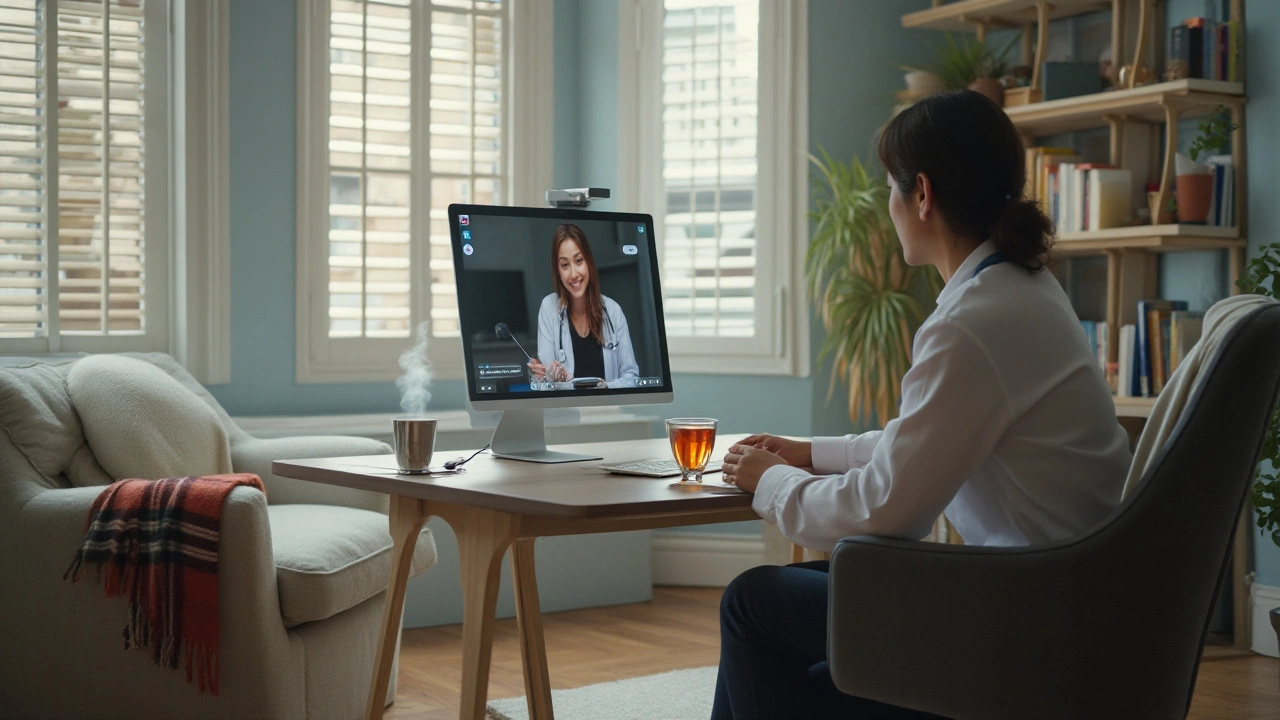With the rise of telemedicine reshaping healthcare access, choosing the right platform can be a daunting task. As 2025 unfolds, several alternatives to FelixForYou.ca have gained popularity, each offering unique features tailored to different healthcare needs. These platforms range from those emphasizing speedy consultations to services providing integrated health systems. In this article, we delve into the specifics of five standout alternatives, examining their strengths and potential drawbacks, to guide you in selecting a telemedicine service that aligns with your lifestyle and health requirements. Let's navigate through these healthcare innovations together.
Maple
Maple, a leading player in the telemedicine space, has taken patient care accessibility to unparalleled heights in 2025. This platform stands out due to its promise of 24/7 access to licensed healthcare professionals, which means you can connect with a doctor any time of the day or night. Such round-the-clock availability provides immense peace of mind for users, knowing that medical advice is always within reach. One of the revolutionary aspects of Maple is its user interface, which is intuitive and designed to make even the least tech-savvy users feel comfortable. Its user-centric design prioritizes ease, allowing patients to seamlessly navigate through services ranging from virtual consultations to seamless prescription management.
Maple's comprehensive scope extends beyond general consultations, offering specialty services that cater to a broad spectrum of health concerns. From mental health to dermatological care, its expansive network of specialists is just a few clicks away. However, there may be instances where certain specialty services incur additional charges, and some offerings might not be fully covered by insurance. Despite this, the platform has achieved notable recognition for being largely covered by provincial health plans, making it a cost-effective solution for many Canadians. The convenience of having consultations and medical records managed digitally highlights a significant shift in the way healthcare operates today.
Pros
- 24/7 access to healthcare professionals
- Broad range of services including specialty care
- Highly user-friendly interface
- Generally covered by provincial health plans
Cons
- Additional charges for certain specialty services
- Insurance coverage may not extend to all offerings
A testament to Maple's growing influence is reflected in user reviews and industry experts' opinions. As one expert noted in a 2024 health innovation summit,
"Maple has set a benchmark in telemedicine, offering an accessible and comprehensive platform that caters to the modern-day healthcare seeker."This underscores the platform’s commitment to providing exceptional service while continuously evolving to meet patient expectations. Maple’s expansive offerings and constant availability position it as an invaluable tool in modern healthcare, delivering expert consultation and management straight to your home. This evolution not only enhances patient convenience but also ensures continuity of care, bridging the gap between patients and healthcare providers effectively.
Tia Health
As telemedicine advances into 2025, Tia Health stands out as a beacon of efficiency and convenience, offering a service that has swiftly become a household name in the realm of telemedicine alternatives. Known for its commitment to quick access to medical consultations, Tia Health prioritizes speed in its customer service model. It opens the door to healthcare from the comfort of one’s living room, making doctor visits more accessible than ever before. The platform's design is centered around user-friendly interfaces that ensure even those with little tech-savvy can navigate it with ease. The demand for such simplicity is no surprise, as busy lives thrive on solutions that conserve time without sacrificing quality. It's an ideal choice for people who value their time as much as they do quality medical care.
Tia Health collaborates with a wide network of healthcare professionals, each dedicated to providing quick but thorough consultations. Users can book appointments that fit seamlessly into their schedules, ensuring minimal disruption to daily activities. This flexibility is especially beneficial for individuals juggling work commitments or familial responsibilities. Importantly, Tia Health also extends its services past basic consultations to offer prescription services, allowing patients to obtain necessary medications without leaving home. It effectively marries technology and healthcare, providing solutions that are not just efficient but significantly impactful in everyday life. A recent survey highlighted that over 80% of users found the platform significantly reduced traditional waiting times, a testament to its promise of expediency.
One might wonder about the limitations of such a platform. While Tia Health prioritizes speed, it is crucial to acknowledge that some fees may apply to its services, depending on the specific healthcare plan. Despite this, the platform remains a cost-effective alternative for many, given the time and resources saved from eliminating travel and waiting room times. Tia Health’s mission aligns with the growing need for accessible healthcare, embodying a model that could inspire the future of medical consultations. However, it’s important to be aware that insurance coverage might not always extend to all services offered, a factor users should consider when planning their health expenditures.
"Tia Health bridges the gap between traditional healthcare delivery and modern needs, offering a solution that is both timely and reliable." - Dr. Eleanor Brooks, Health Innovation Expert.
Incorporating technological advancements, Tia Health has implemented features to ensure safe and secure patient communication. Privacy is a cornerstone of their service, safeguarding patient information with robust encryption methods. This assurance is vital in an age where data breaches frequently headline news stories. Users can rest assured that their consultations are confidential and conducted with the highest standards of security. As telemedicine platforms continue to evolve, Tia Health sets a benchmark in combining reliability with ease of access, crafting an experience that prioritizes the modern individual's preference for digital solutions over traditional models.
Pros
- Fast service delivery
- Efficient consultations
- Accessible from home
Cons
- Some fees may apply
- Limited plan coverage

Livewell
In an era where digital solutions are rapidly transforming healthcare, telemedicine platforms like Livewell stand out for their innovative approach to delivering medical services. This platform offers quick and convenient consultations, encapsulating the essence of modern, fast-paced lifestyles. At its core, Livewell is designed for those who value efficient service delivery and accessibility, ensuring that healthcare is merely a click away, regardless of time or location.
Livewell provides a plethora of health services, including consultations, prescriptions, and professional medical advice, delivered with an impressive speed. This digital platform allows patients to connect with healthcare providers without the need for physical visits, saving both time and the inconvenience that comes with traditional healthcare setups. Being a frontrunner in telehealth, Livewell enables users to address their medical concerns comfortably from home. Hospitals and clinics, often burdened with long waiting times, become a secondary option as Livewell offers a much-needed solution for individuals with tight schedules or mobility issues.
One fascinating aspect of Livewell is its potential to bridge gaps in healthcare accessibility. Rural populations, typically underserved due to geographical constraints, benefit significantly from this technology. According to a report by The Canadian Telehealth Forum, patient satisfaction rates for telemedicine services have seen a significant increase, particularly in rural settings since they eliminate the need for long-distance travel. Thus, Livewell not only enhances convenience but also supports inclusivity by making quality healthcare available to a broader demographic.
"Telemedicine represents an evolution in medical access, promoting health equality and offering patients unprecedented ease of contact with medical professionals,"—Dr. Sarah Johnson, healthcare technologist.
While Livewell excels in quick consultations, several users have pointed out some issues, especially around pricing transparency. Some patients require clarity on costs, which might vary depending on the service and their health coverage. Since provincial plans can differ, it’s advisable for users to review their coverage options to avoid unexpected expenses. It's noteworthy that telemedicine services like Livewell are continually working on improving these aspects to foster trust and user satisfaction.
Moreover, Livewell’s model is aligned with current trends towards digital health records. Easily accessible medical histories ensure that both patients and healthcare providers stay informed, facilitating better decision-making and personalized care plans. As technology continues to advance, platforms like Livewell reshape our understanding and expectations of healthcare, merging efficiency with technological innovation. This trend is expected to grow, with more enhancements focusing on patient-centric care and further integration with digital health solutions.
Telus Health
In an era where telemedicine has become a cornerstone of healthcare, Telus Health emerges as a beacon for those seeking a comprehensive and integrated healthcare experience. With a platform that transcends basic consultations, Telus Health embodies a one-stop-shop for an array of medical needs, catering to modern-day demands for seamless accessibility. Unlike many alternatives, Telus Health integrates consultations, prescriptions, and medical records management into a coherent system, making it a prime choice for those who value continuity and coordination in their healthcare journey. The platform's hallmark is its subscription-based model that allows users to tap into a consistent network of healthcare services, oftentimes reducing the fragmented experiences seen with using disparate providers.
Telus Health not only offers a wide scope of services but is also deeply embedded within technological ecosystems, leaning on digital interactions that simplify the doctor-patient relationship. This tech-forward approach addresses the growing consumer preference for app-based interactions, ensuring that health management is literally at one's fingertips. Analysts have touted such models as the future of healthcare, citing their ability to enhance user engagement and satisfaction. A core feature is the meticulous management of medical records, where patients can have peace of mind knowing all their medical information is housed centrally, accessible whenever and wherever needed. One cannot overlook the convenience this brings, as every interaction is synchronized and stored, significantly reducing redundancies and the need for repeated tests or consultations.
"Innovations in telehealth, such as those championed by Telus Health, are crucial in reshaping how communities manage health and wellness on a broad scale," remarked a well-regarded health policy analyst in a recent publication.
Another appealing aspect of Telus Health is the subscription model, which, while requiring an up-front financial commitment, pays dividends in the form of streamlined care access and often reduced out-of-pocket expenses down the road. Subscribers access a reliable network of professionals without worrying about unexpected costs for routine services. This model promotes regular health checkups and proactive health management, which is a notable shift from the reactive healthcare patterns traditionally seen. The ecosystem Telus Health has crafted supports a holistic approach to health, nullifying the fragmented nature of typical fee-for-service models.
However, potential users should be aware that even in this well-crafted system, certain specialty services may incur additional fees, calling for vigilance in understanding the scope of one's subscription. That said, many find the predictability of the costs well worth the certainty and ease of use that Telus Health provides. These pros and cons illuminate the thoughtful design behind the platform, tailored to address both today's instantaneous needs and foresighted health planning for the future.

GOeVisit
When you're seeking swift medical advice from the comfort of your own home, GOeVisit stands as a formidable alternative you'll want to consider. Providing quick and reliable access to telemedicine, this service is particularly tailored for those who need urgent, yet non-emergency medical attention. Founded with the principle of accessibility and efficiency, GOeVisit has swiftly grown in popularity among users who want convenience without compromising quality. By eliminating the need for long waiting times at clinics, it ensures that healthcare is just a few clicks away. The platform is renowned for its straightforward interface that helps users connect with healthcare professionals effortlessly.
One of the platform's standout features is its capacity to deliver quick consultations. Whether you are experiencing a sudden rash or need a routine prescription refill, GOeVisit makes it possible to consult qualified practitioners who can guide you through the necessary steps in addressing your health concern. In many cases, consultations take place entirely online, meaning no commute time and no waiting rooms, enabling patients to get the care they need swiftly. With healthcare technologies continuously evolving, GOeVisit integrates the latest advancements to ensure a seamless user experience. Recently, a study indicated that telehealth solutions like GOeVisit have seen a 30% increase in user satisfaction compared to traditional in-person visits.
Although the service shines in many areas, potential users should be aware of certain limitations. Insurance coverage can vary significantly depending on the province or territory, leading some users to incur charges that might not be expected. Additionally, while GOeVisit is incredibly effective for rapid consultations, it might not be suitable for patients requiring a comprehensive medical examination or diagnostic tests, which are better conducted in-person. Understanding these nuances is critical for ensuring you choose the right telemedicine solution that fits your health needs perfectly.
In an era where remote healthcare is rapidly becoming the norm, GOeVisit is carving out its space by catering to individuals who require expedient and trustworthy medical advice. As telemedicine continues to disrupt the traditional healthcare model, platforms like GOeVisit are playing a crucial role in bringing medical care into the digital age. Their commitment to providing efficient service from the comfort of one's home makes them an invaluable resource in today's fast-paced world.
Conclusion
As we look ahead in 2025, it becomes increasingly evident how telemedicine platforms have evolved and shaped the way we access healthcare. Each of the alternatives to FelixForYou.ca presents a unique blend of benefits and challenges. Whether it's the 24/7 access provided by Maple, efficient and swift service delivery by Tia Health, or the seamless integration of services offered by Telus Health, there's something for every healthcare need.
Choosing the right telemedicine service relies heavily on individual needs and preferences. For those who value access to a wide array of resources at any given time, Maple's reach across various health services can be crucial. Its broad service scope and ease of use make it an excellent choice for versatile healthcare. Alternatively, Tia Health's focus on speed positions it as the go-to for patients requiring fast consultations and medical advice without leaving the comfort of their home.
Meanwhile, for those who emphasize quick and reliable service, Livewell and GOeVisit offer robust solutions. These platforms cater to patients looking for efficient healthcare options that don't compromise on quality. The comprehensive services provided by Telus Health further expand the spectrum, integrating various facets of healthcare into one cohesive platform. This subscription-based option may especially appeal to individuals who anticipate regular interactions with healthcare professionals.
"Telemedicine is not just a fad; it's a revolution in healthcare." — Dr. Jacqueline Smith, a well-respected pioneer in digital health innovations
As more people turn to digital solutions for their health concerns, understanding the specific offerings and potential costs of these alternatives becomes critical. While some may face limitations through provincial health plan coverage or additional fees, understanding these aspects can lead to more informed decisions, ultimately enhancing the way individuals experience healthcare.
| Platform | Strength | Considerations |
|---|---|---|
| Maple | Wide access, 24/7 availability | Specialty services may incur fees |
| Tia Health | Fast, efficient | Possible limited coverage |
| Livewell | Quick consultations | Costs may not be clear |
| Telus Health | Integrated, subscription model | Subscription required, extra fees |
| GOeVisit | Urgent care focus | Plan coverage limited |
The innovation in telemedicine presents a myriad of opportunities and challenges. By weighing the service scope, accessibility, potential fees, and personal healthcare needs, individuals can determine the right path forward. As technology continues to revolutionize our daily interactions, its influence on healthcare is certain to grow, paving the way for more personalized and effective healthcare experiences.

